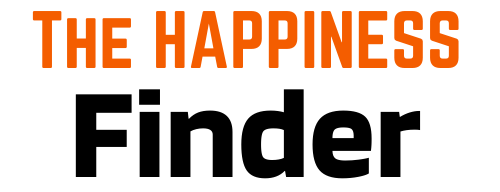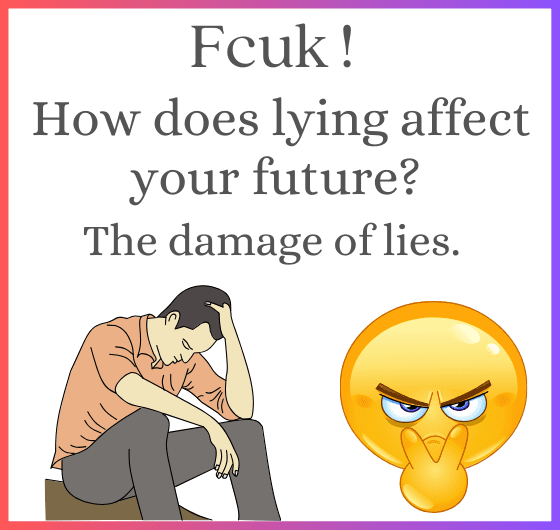Lying may seem like a quick fix to avoid trouble, but it can have a lasting impact on your future. It can damage your relationships, hinder your opportunities, and create unnecessary stress. Being truthful and honest is not always easy, but it’s the best way to build a bright future filled with trust, success, and happiness.
Imagine you’re in school, and your teacher asks if you did your homework. You didn’t, but you tell a fib and say you did. This might seem like a small thing, but it sets off a chain reaction. First, you might get away with it this time, but soon, your teacher will catch on, and you’ll lose trust. When people don’t trust you, it’s tough to build good relationships.
Imagine your life as a book with blank pages, waiting to be written. Honesty is like the ink that creates clear, meaningful stories. But when lies sneak in, they smudge the pages and blur the lines of your future.
“Honesty is the first chapter in the book of wisdom.” — Thomas Jefferson
Trust Bridges: Trust is like a bridge connecting you with others. Lying weakens these bridges, making connections shaky. Think about a friend who lied to you. Your trust in them might waver, affecting your future interactions.
Missed Opportunities: Lies can shut doors that might have opened. Imagine you lie on your resume to get a job, but when the truth is revealed, you lose that chance. Those lies can limit your future opportunities.
Erosion of Reputation: Reputation is like a shadow that follows you. Lies can darken that shadow. Consider someone who spreads false rumors. Their reputation gets tarnished, impacting their future relationships.
Chains of Deceit: One lie can lead to another, chaining you to dishonesty. It’s like wandering deeper into a forest without a map. These chains make it harder to build a truthful future.
Loss of Credibility: Credibility is like a precious jewel. Lying can crack that jewel. Imagine a leader caught in a lie – their followers might doubt them, affecting their ability to lead.
Broken Promises: Lies can shatter promises like fragile glass. Think about someone who promised to be there but didn’t show up. Those broken promises can weaken your future connections.
Guilt’s Burden: Lies carry guilt like a heavy backpack. It’s like carrying a load that slows you down. Picture lying to a loved one – the weight of guilt might impact your future interactions with them.
In conclusion, lying isn’t just a momentary act; it’s like a pebble creating ripples that spread across the pond of your life. Lies weaken trust bridges, close doors to opportunities, erode reputation, create chains of deceit, damage credibility, and burden you with guilt. So, as you journey through life’s chapters, remember that honesty is the ink that writes a future filled with meaningful connections, endless possibilities, and a heart at peace.
“A lie may take care of the present, but it has no future.”
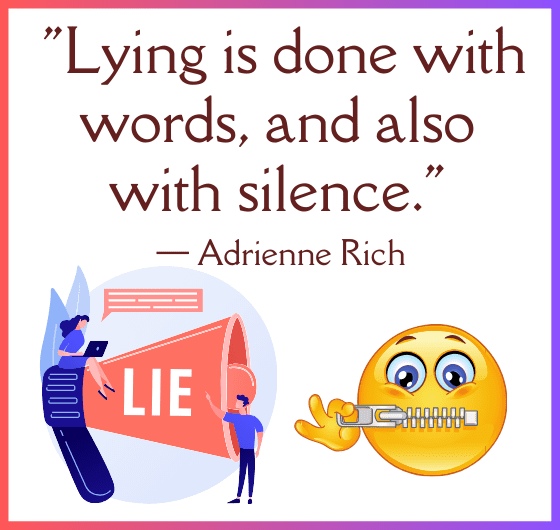
What are the types of lies?
Imagine lies as a colorful mosaic, each tile representing a different type. These tiles come together to form a picture of the many ways lies can affect us.
White Lies: These are small lies meant to protect feelings. Imagine a friend asks if you like their new haircut. Even if you’re unsure, a white lie like “It looks great!” can spare their feelings.
Exaggerations: Exaggerations stretch the truth for effect. Think about someone saying “I’ve told you a million times!” – they haven’t actually counted but use the phrase for emphasis.
Omissions: Omissions hide parts of the truth. Imagine you went to a party and didn’t mention the argument you had with a friend there. It’s like leaving out a piece of the puzzle.
False Promises: False promises are like clouds that disappear without rain. Think of someone promising to help you move but backing out at the last minute.
Deception by Silence: This type involves not telling the whole truth. Imagine your parents ask if you finished your homework, and you stay quiet about the part you didn’t complete.
Fabrications: Fabrications are complete inventions. Picture someone claiming they climbed Mount Everest when they haven’t. It’s like weaving a fictional tale.
Plagiarism Alert: Plagiarism is copying someone else’s work and claiming it as your own. It’s like picking flowers from someone’s garden and saying you grew them.
Redirecting Blame: Redirecting blame shifts responsibility. Imagine breaking a vase and blaming it on the cat. It’s like passing the buck to avoid consequences.
Identity Lies: Identity lies involve pretending to be someone you’re not. Think of someone online pretending to be famous – they’re creating a false identity.
Compulsive Lying: Compulsive lying is like a habit that’s hard to break. It’s when someone lies without a clear reason. Think of a friend who makes up stories just for attention.
Fraud: Fraud is lying for personal gain. Imagine someone selling a fake product online – it’s like tricking people for money.
In conclusion, lies come in many shades, each with its own impact on our lives. Whether they’re white lies, exaggerations, or fabrications, each type can shape our relationships and interactions. Understanding these types can help us navigate the intricate landscape of honesty and deception, guiding us towards building connections based on trust and authenticity.
“The truth is rarely pure and never simple.” — Oscar Wilde
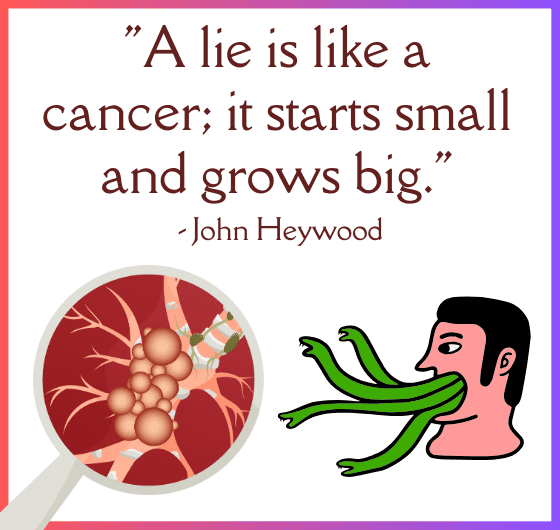
What is the damage of lies?
Imagine lies as dark clouds that cast shadows over our lives. Each lie, big or small, leaves behind scars that can affect us in unexpected ways. Let’s lift the veil on the hidden wounds that lies can inflict.
Trust Fractures: Trust is like a fragile glass ornament. Lies are like cracks that weaken its foundation. Consider a friend who promised to keep a secret but broke that promise. The trust you had starts to shatter, much like that delicate ornament.
Relationship Erosion: Lies can erode relationships like waves erode the shore. Imagine someone close to you lying about their feelings. With time, the truth comes out, and the bond you shared is washed away by feelings of betrayal.
Self-Esteem Bruises: Lies can bruise your self-esteem. Each lie chips away at your self-worth. Think about pretending to know something you don’t. When the truth surfaces, you might feel embarrassed and question your abilities.
Web of Deceit: One lie often leads to more lies, forming a tangled web. It’s like a labyrinth where you can get lost. Imagine lying to your family about your plans. Soon, you’re caught in a web of lies that’s hard to escape.
Lost Opportunities: Lies can close doors that were once open. Suppose you lie on your job application. If you get the job, you might struggle to meet expectations, leading to disappointment for both you and your employer.
Mental Burden: Lies carry a heavy mental burden. It’s like carrying a weight that slows you down. Imagine lying to a friend about an event you didn’t attend. The guilt of the lie can cloud your mind and affect your peace.
Crumbling Reputations: Reputations are delicate, like castles made of sand. Lies can crumble those castles. Think about someone spreading false rumors – their reputation is tarnished, affecting their standing in the community.
Isolation’s Embrace: Lies can isolate you from others. It’s like building walls around yourself. Imagine lying about your interests to fit in with a group. In the end, you might feel alone, and disconnected from your true self.
In conclusion, lies may seem like fleeting shadows, but their impact can be deep and lasting. They fracture trust, erode relationships, bruise self-esteem, create webs of deceit, close doors of opportunity, burden the mind, crumble reputations, and isolate us from authentic connections.
As we navigate the intricate tapestry of life, remember that the path of truth, though sometimes challenging, is one that leads to genuine relationships, inner peace, and a heart unburdened by the weight of deceit.
“Lying is done with words, and also with silence.” — Adrienne Rich
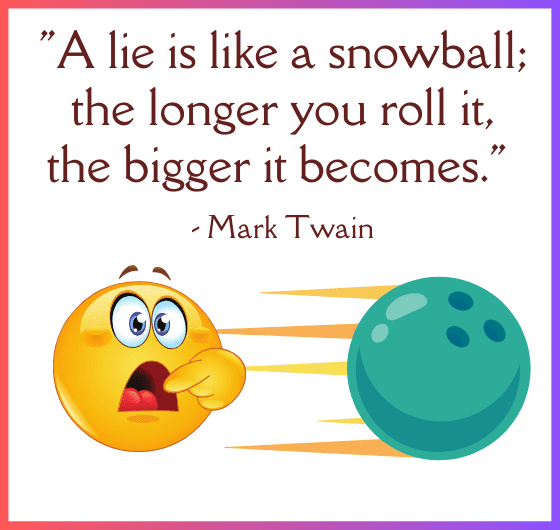
What are three reasons why lying is bad?
Imagine honesty as a steady foundation that holds up our relationships. Lies, however, are like termites that weaken this foundation, leading to a shaky structure. Let’s uncover the reasons why these termites should be kept at bay.
Eroding Trust: Trust is like a delicate glass sculpture. Lies are like tiny cracks that form on its surface. Imagine a friend who tells you a lie, breaking your trust. Just like those cracks mar the sculpture’s beauty, lies erode the beauty of trust in relationships.
Hurting Relationships: Lies can hurt relationships like thorns hidden among flowers. Think about telling a lie to a loved one, and when they discover the truth, it’s like they’ve been pricked. This hurt can linger, making it difficult to mend the bond.
Creating Cycles of Deceit: One lie often leads to more lies, like a domino effect. It’s like weaving a web that entangles you. Imagine lying about being sick to skip work. Soon, you need more lies to cover the initial lie, trapping you in a web of deception.
Now, let’s explore these reasons using a real-life example. Imagine a student who lies to their teacher about completing their homework. The student’s intention might be to avoid getting in trouble. But when the truth comes out, trust between the student and the teacher is damaged.
The student’s friends might also hear about the lie, causing hurt feelings and strained relationships. This lie creates a cycle of deceit, as the student now needs more lies to cover up the initial untruth. The example illustrates how lying can erode trust, hurt relationships, and create a cycle of deception.
In conclusion, while lying might seem like a quick way out, it’s like building a fragile house on a weak foundation. Lies erode trust, hurt relationships, and lead to cycles of deceit. As we navigate life’s twists and turns, remember that the road of honesty might be challenging at times, but it’s one that leads to sturdy relationships, open communication, and a heart at peace.
“The biggest liar you’ll ever meet is your own fear
Is lying a life skill?
Imagine life as a canvas awaiting colorful strokes. Honesty is like the paint that brings out vibrant shades. However, lying is like a shadow that sometimes sneaks into the canvas. Let’s delve into whether this shadow is an essential part of life’s masterpiece.
Understanding Social Dynamics: Some might argue that lying is a skill because it helps us navigate social situations smoothly. For instance, think about a surprise party. Lying about the event can add an element of surprise and joy to the occasion.
Preserving Feelings: Lying can also be seen as a way to protect others’ feelings. Imagine a friend wearing a new dress they’re proud of. Even if you don’t particularly like it, a kind lie like “You look great!” can preserve their happiness.
Now, let’s explore this question with a real-life example. Imagine someone organizing a surprise anniversary party for their parents. To keep it a secret and ensure the surprise remains intact, the person might need to tell a few lies – like planning a different event or hiding decorations. In this case, lying becomes a skill to create a joyful experience and maintain the surprise element.
However, while lying might seem like a skill in certain situations, it’s essential to remember that honesty is the foundation of strong relationships. Imagine a scenario where someone lies about their abilities on a job application to get hired. While this might seem like a skillful move, it can lead to trouble down the road if their actual abilities don’t match their claims.
In conclusion, the question of whether lying is a life skill is like navigating a complex maze. While lying might have its place in specific situations, it’s crucial to tread carefully. Honesty remains the cornerstone of trust, open communication, and meaningful relationships. As we paint the canvas of life, let’s remember that while shadows might add depth, it’s the vibrant strokes of truth that truly create a masterpiece worth cherishing.
“When you tell a lie, you steal someone’s right to the truth.” — Khaled Hosseini
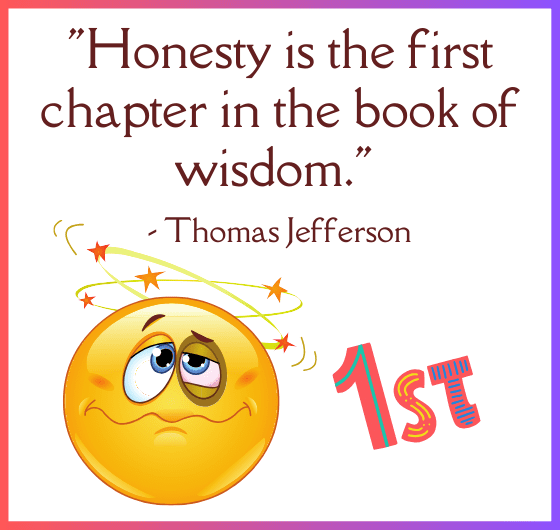
What are the five reasons for lying?
Five Common Reasons for Telling Lies
Protecting Feelings: Sometimes, we tell lies to protect others’ feelings. Imagine a friend asking if their new haircut looks good. Even if you’re not sure, a gentle lie like “It suits you!” can spare their feelings and maintain harmony.
Avoiding Trouble: We often lie to escape trouble or punishment. Imagine not completing your homework and lying to the teacher about it. The lie might save you from consequences, but it sets a path of dishonesty.
Seeking Attention: Some lies are told to gain attention or impress others. Picture someone boasting about imaginary achievements to get noticed. These lies might initially get attention, but they lack the authenticity that true accomplishments bring.
Covering Mistakes: We sometimes lie to hide mistakes or failures. Imagine accidentally breaking a vase and blaming it on someone else. This lie might avoid immediate consequences, but it erodes trust and leads to bigger problems.
Gaining Advantage: Lies can also be told to gain an advantage or to manipulate situations. Think about someone exaggerating their skills to get a job. This lie might secure the position, but it creates expectations that might not be met.
Now, let’s weave these reasons together with a real-life example. Imagine a student who didn’t study for an exam. They might lie to their friend, saying they aced it. The intention here is to appear successful and avoid embarrassment. However, this lie could lead to more lies if the friend congratulates them publicly, putting them in a tough spot.
As we navigate these motives, it’s crucial to remember that while lies might seem like quick fixes, they can create complications down the road. Lies built on protecting feelings, avoiding trouble, seeking attention, covering mistakes, or gaining advantage might lead to a tangled web of deceit. As we walk the path of life, let’s aim for a journey marked by honesty, trust, and genuine connections.
“A lie gets halfway around the world before the truth has a chance to get its pants on.” — Winston Churchill
Can lying be a problem?
Imagine honesty as a guiding star, leading us through the twists of life. Lying, on the other hand, is like a fog that can cloud our path. Let’s journey through this fog and discover whether it can truly lead us astray.
Breaking Trust: One reason lying can be a problem is because it breaks trust. Trust is like a fragile vase that takes time to build but can shatter with a single lie. Imagine a friend lying to you – the trust you had might crumble, making it hard to rebuild.
Hurting Relationships: Lying can hurt relationships, like a thorn hidden among flowers. Think about telling a lie to a loved one. When they find out, it’s like they’ve been pricked by that thorn. This hurt can linger, making it challenging to mend the bond.
Creating a Web of Deceit: Lying often leads to more lies, like a spider spinning a web. It’s like stepping deeper into a maze. Imagine lying about something small, and soon you need more lies to cover up the initial untruth, trapping you in a web of deception.
Let’s weave this together with a real-life example. Imagine someone promising to help a friend move but then lying about being sick on moving day. The intention might be to avoid the task, but this lie can break trust, hurt the friendship, and even lead to more lies to cover up the initial untruth.
While lying might seem like a quick fix, it often creates more problems than it solves. It’s like choosing a thorny path instead of a clear one. As we journey through life, let’s remember that honesty is the compass that guides us to authentic relationships, open communication, and a heart at peace.
“A single lie destroys a whole reputation for integrity.” — Baltasar Gracián
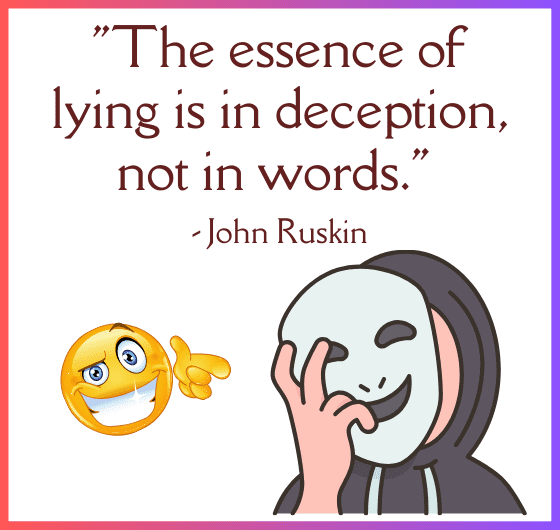
Story:
Title: The Wise Sadhu’s Lesson: Unveiling the Harm of Lies
In a peaceful village nestled at the foot of the mountains, lived a revered Indian sadhu named Swami Hari. He was known for his wisdom and kind heart, and many sought his guidance. One day, a curious young man named Raj approached Swami Hari, seeking answers about the complexities of life.
“Swamiji,” Raj began, “why do some people lie? Is lying really that bad?”
Swami Hari smiled gently and motioned for Raj to sit beside him. He began to share a story.
“Raj, imagine a blooming garden where each flower represents a truth. Now, let’s think of lies as weeds that slowly spread. A garden full of weeds cannot flourish just as a life full of lies cannot prosper.”
Raj listened intently, eager to learn more.
“Let me share a real-life example,” Swami Hari continued. “Once, there was a young man who wanted a job, but he didn’t have much experience. Instead of being honest about his skills, he told the employer he was an expert. He got the job but struggled to meet expectations. This lie not only harmed his reputation but also created stress and tension for him.”
“But Swamiji,” Raj questioned, “aren’t there times when lying might seem necessary?”
Swami Hari nodded, acknowledging the complexity of the question. “Raj, while there might be situations where a lie seems convenient, the consequences can be greater than the momentary relief it offers.”
He continued, “Let me share another tale. A kind-hearted woman once lied to her friend, saying she couldn’t attend a gathering. Her friend found out later that she had actually gone to another event. This lie led to hurt feelings, eroding their trust and straining their bond.”
Raj’s eyes widened with understanding as he grasped the lessons hidden within these stories.
“Raj,” Swami Hari said kindly, “lying might seem like a shortcut, but it often leads to a longer, winding path filled with difficulties. Just as truth is like a lamp that guides us, lies are like shadows that confuse our path.”
Swami Hari’s words resonated deeply with Raj. He realized that even seemingly harmless lies could create ripples of harm in the long run.
As Raj left the ashram that day, he carried Swami Hari’s teachings in his heart. He understood that honesty wasn’t just a virtue but a foundation for a life filled with genuine relationships, trust, and peace. And as he walked the path of life, he vowed to tread the road of truth, guided by the wisdom of the wise sadhu.
And so, the lessons of Swami Hari, woven into stories of real-life experiences, continued to inspire countless souls to embrace honesty as a beacon, illuminating their journey through the tapestry of life.
“A lie has the power to tarnish a thousand truths.” – Al David
